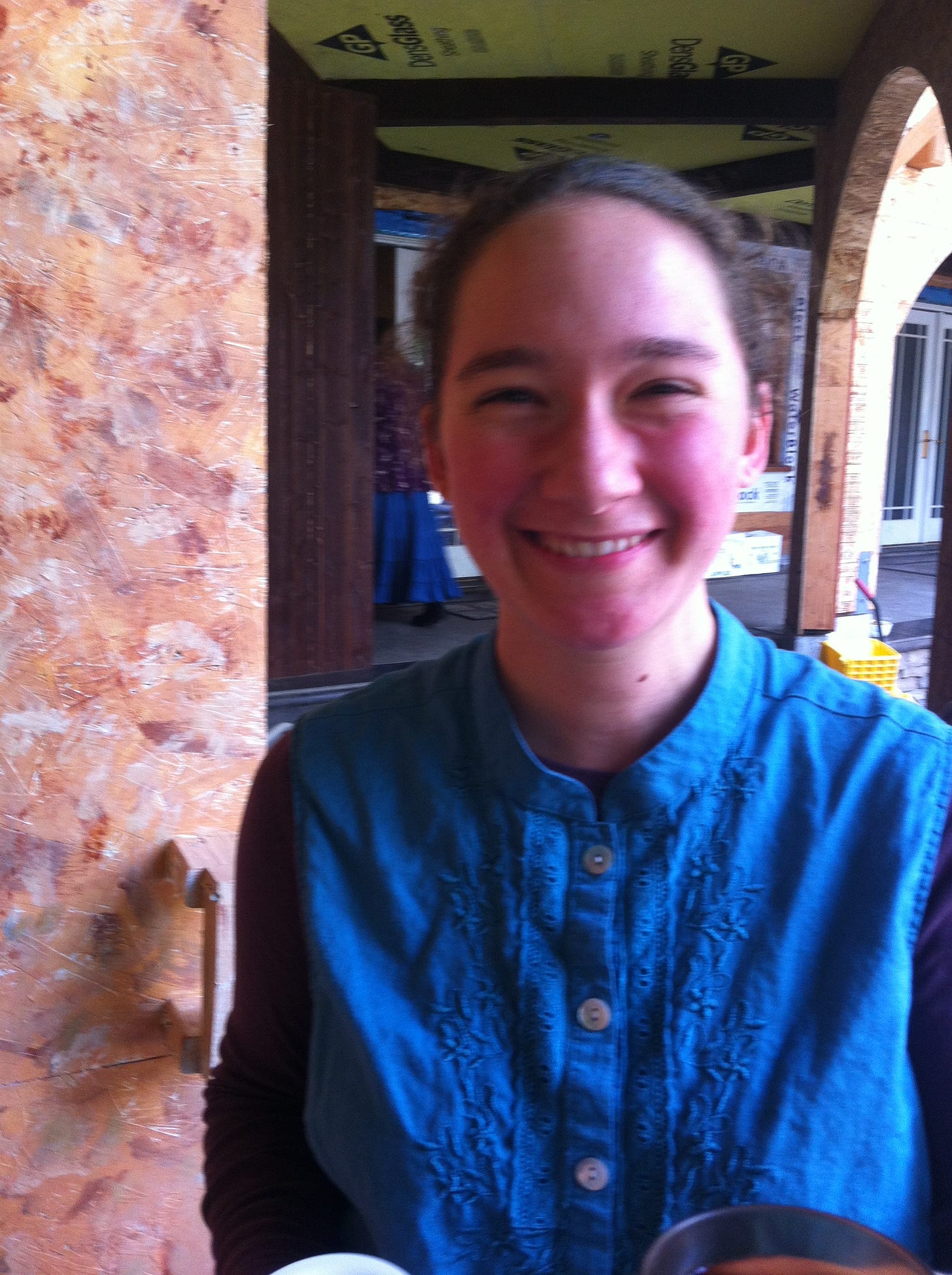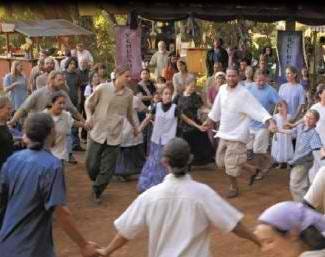In September 2014, as I headed out on my US west coast road trip, I made a brief stop at a Twelve Tribes commune on Vancouver Island to pick up my friend Elli. Elli had been WWOOFing (organic farm volunteering) there for a week, and had enjoyed herself so much that she didn’t quite want to leave. Having reassured myself, after interrogating Elli at length on her experiences, that the Twelve Tribes would not forcefully convert me if I were to stay there for a short time, I decided to follow the members’ suggestion to visit their sister establishment in California while traveling down the west coast.
Now here I was, a few months later, crammed in a phone booth south of Los Angeles, crumpled Twelve Tribes newspaper in my hand, listening to the phone ring on the other end. The ringing stopped and I heard a distant “Hello? through the line. It was a male voice, vaguely reminiscent of the German Mennonite farmers I was accustomed to hearing in Ontario. I explained my situation, my past connection to the BC commune, and asked if I would be able to sleep at their place for 2 nights that coming weekend. “Well…I don’t see why not,” said the voice slowly. He took my name, gave me directions to their café in Vista, and suggested I show up on Friday between 4 and 5pm as they would be closing early for the Friday evening Sabbath gathering and dance.
Well! I thought. This should be an experience!
And that was how I found myself walking up to the front doors of the Yellow Deli Café in Vista, California that Friday. My first impression was that it had to be the funkiest, coolest, most interesting, café I’d ever seen in my life.
As I walked through the front gates, a balding man in his sixties was coming down the walk toward me. “You’re just in time!” he shouted. “We are closing soon for Sabbath but you made it!” As I introduced myself I realized he’d thought I was just another customer. The Yellow Deli has an interesting policy of being open 24 hours, 6 days a week…closed only for their Sabbath. You can sit and have a tea and study there at 3am if you like, and many students do. As soon as he realized who I was, Eliahu pulled me into the bustle of the back kitchen and introduced me enthusiastically to a young girl who had been working behind the counter. She was assigned to show me around and serve me dinner. My tour of the café did nothing to change my first impressions: on my list of all-time favourite funky cafes, the Yellow Deli rates near the top.
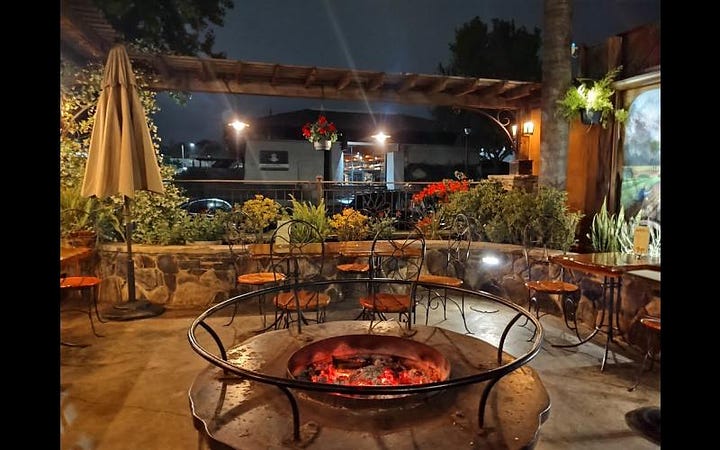
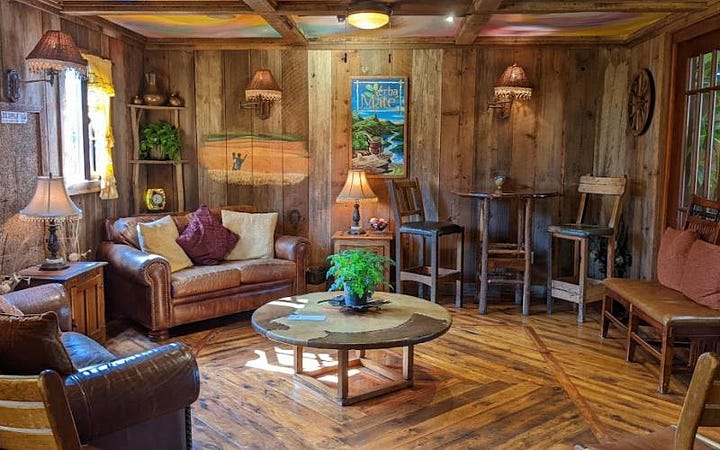

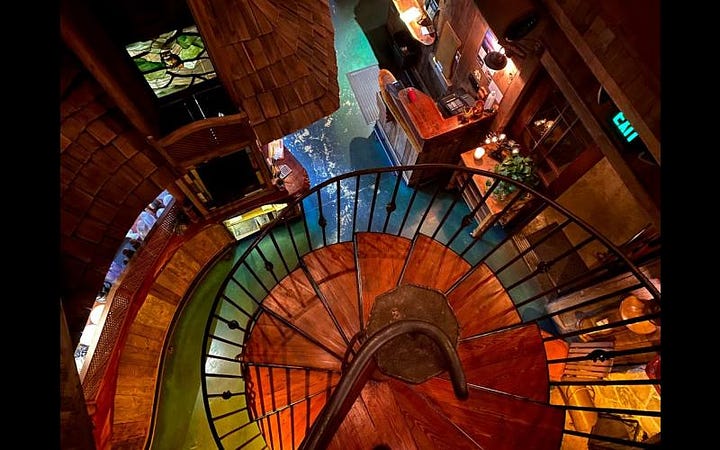
I was served an amazing organic sandwich, which I ate on a private balcony looking out from a rooftop garden. When I was done, I brought my dishes down to the back kitchen, found my new friend, and asked how I could help. I soon found myself scrubbing dishes in an industrial sink and wiping down counters. There must have been 20 young people working in a space so small it was impossible to walk through without bumping into people, counters, equipment, and carts. The ‘bakery’ was the size of my bathroom at home. The whole kitchen was an area the size of a one-car garage, and from it fresh bread was being baked, meals were cooked from scratch, dishes were being washed, ingredients prepped, and everything was happening with smiles, efficiency, politeness, and even some cheerful whistling. No one was slacking, that’s for sure.
When we were finished our respective jobs, another girl was assigned to drive back with me to the complex where half the young people lived. It was a large bungalow on a side street of Vista, not far from the downtown area, nestled on a piece of land with trees, bushes, some gardens, a pool, two small bunkhouses, and a garage/schoolhouse. I was given a tour and shown my bed in the ‘girls’ bunkhouse. Single women and men sleep in separate bunkhouses until they get married, at which point they are given a room together, usually in one of the houses. Courtship and marriage are a complicated process that involve parental consent and an application to the council of elders who are responsible for discerning Yashua’s (Christ’s) will. Until that point, not even hand holding is permitted.
Twelve Tribes do not consider themselves ‘religious’, in that they do not adhere to an outside religious institution – they consider all parts of their life to be spiritual, and they gather together daily for music, teaching, and inspiration. Their teaching is ‘biblically based’ and their culture seems very Old Testament.
I had a bit of time free before we were to all drive to the property where the weekly Sabbath gathering and dance take place. I asked if I could go into town to send an email. “Yes…” said my guide, the hesitation in her voice informing me that this wasn’t a typically-accepted activity, but that since I was a guest the rules would be bent. “When you come back, you might want to…change your shirt…” she suggested, tentatively. “We always make sure our arms and chest are covered, up to the neck. If you don’t have anything else you can wear one of my mine…” I told her no, it was ok – I would drum something up. I walked into town, already finding myself eager to get out and be by myself…happy to walk around alone in my tank top.
On my return, everyone at the house was excitedly hopping into cars and vans, dressed in their best, hair brushed. Twelve Tribes members follow a strict dress code. Not only do they cover skin for modesty, but they adhere to an attire similar to Mennonite or Amish garb. Men wear plaid or plain button-up shirts and khaki pants or jeans. Their hair is worn in ponytails, cut off bluntly a few inches below the elastic band, and they sport full beards. Women wear long skirts or gathered harem-type pants, and blouses with long sleeves. Hair is also gathered back, without bangs. Glasses are circular, wire-rimmed
No one buys their own clothes. Clothes, food, toiletries…all is provided by Twelve Tribes in exchange for your work and participation. It is not seen as a direct trade. When you become a member you are taken care of, out of love. In return, out of love, you want to give back to the community so you do whatever is needed of you, in gratefulness and with a cheerful heart.
One of my new friends there talked about how on first arriving she worked at the farm, then was moved to the café, and had now been promoted to working full-time at the café. Full time meant working from 5am to 10pm every day. “Don’t you get tired and burnt out??” I asked in horror.
“Hmm. No…no I don’t,” she said thoughtfully. “Before I came to Twelve Tribes, yeah, I would get really tired when I had to work a long day, but here…here I never feel tired. It doesn’t feel like work. It’s just life, doing things side by side with my friends every day.”
“What about if you get sick?” I asked. “Do you get time off?”
“Well yes, they do want us to be well, so they give us time off if we are too sick to work…
...unless it’s not possible because they don’t have enough people that day. Everything is based on what’s best for the group, not the individual.”
A more natural and holistic approach appears to be the norm in health-care here, though hospitals and medication are used when needed. From what I could tell, you don’t get to make your own decisions about your health.
“What if you can’t do that kind of work?” I asked. “For example, I have fibromyalgia and don’t have the energy to work that long…and it would hurt my muscles to do many of the tasks you do.”
“Things are taken into consideration – you would do just what you can do. Everyone does as much as they can do.”
We arrived at the second house, across town, a large villa in the midst of ongoing construction. Another segment of the Twelve Tribes population lives here, all women. This is where communal Sabbath meals and whole-group gatherings occur. Circles of chairs were being set up around a fire pit in an outdoor covered meeting space. Flagstone floor, pillars, and a view over the valley. A cup of mate was pushed into my hand. I was introduced to some of the people milling around, while some musicians warmed up on fiddles, flutes and guitars.
The next two hours were a mix of Jewish folk dancing and quaker-style sermon sharing. Though I protested at first, my friends soon succeeded at pulling me into joining several circle dances around the fire. The music was skillful and catchy, with quick rhythms and lilting harmonies, children and elders alike joining in singing to Old-Testament-based lyrics. One by one, people ran up and joined the ever-widening circle of dancers, until the song ended and everyone collapsed laughing and tired in their seats.
Eventually the music slowed down, and the sharing began. People stood up and spoke out about what was on their hearts, to supportive “Amen!”s and nods from those in the circle. It occurred to me as I listened that ‘what was on their hearts’ seemed to actually be more ‘what they had been taught’ than what they really thought. There was no arguing or questioning. Statements usually began with “I am grateful…” – but not in order to describe something the speaker was really grateful for in life, so much as to reiterate something of the Twelve Tribes philosophy. For example: “I am grateful that this week I was able to see more clearly how the children respect their fathers, not out of fear, but out of love, and how the fathers’ job is to correct in love” (choruses of “Amen!”). Small children stood up and haltingly spoke similar philosophies: “I am grateful that I’ve learned that we can’t grow in bad culture. I want to help get rid of the bad culture and be part of the good culture” (“Amen!!”). It was clear to me that some of those seated were ‘elders’, more respected and having more decision-making ability in the community. People seemed to defer to them, and they often gently rebuked or corrected others. “I think what our friend is really trying to say,” said one, when a young man was finished saying his piece, “is that…” and he went on to change the new convert’s self-expression into something that was more in line with accepted philosophy. One of the elders got up and spoke at length, centring out individuals in the audience to answer his questions, like an old-school teacher. “What are we told in Acts 2 about…”, “Where does it say…”, “List for me the attributes that Yashua mentions…” If the ‘students’ were correct, approval; if wrong, admonition and correction… “I’m sure what my brother meant to say is…”
The gathering ended with more music, the crowd dispersed, and we went home. I took a shower, climbed into my narrow (uncomfortable) bottom bunk, and tried to sleep. Every time I turned, the whole bunk moved. I listened to the noises of the five other girls in various states of sleep, and tried to will myself to follow suit. Eventually it must have worked.
The next morning I found myself with some ‘spare’ time before the morning Sabbath celebrations at the Villa across town. “Is it ok if I go do some stretches in the garden by myself?”, I asked one of my companions, who had barely left my side since my arrival.
“Sure!” she said. “We leave in about half an hour.”
“Don’t you ever spend time alone?” I asked. “Do you go for walks by yourself?”
“Well…not really. We don’t focus on spending time on ourselves – we want to spend time with the group and learn to be together. I guess when I worked on the farm I used to spend more time by myself and go for walks. I don’t really miss it though.”
My god.
I went into the gardens and wandered by myself through the trees. Some teen boys were sitting down near the end, so I detoured into the bushes along the fence. Several young boys came racing through, screaming and playing a catch game. Not for long though…a mother was watching closely from the back door of the house and quickly called out, reprimanding them on the type of play and insisting that they keep their voices down. A father came over, pulled them all aside, sat them down, and gently lectured them on the merits of calmness.
To Be Continued Next Week…







